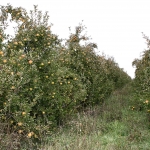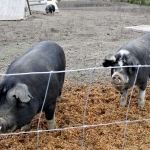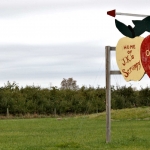Michigan grower Jim Koan is concerned about the future of organic production and is actively trying to shape it.
Koan, who has 150 acres of organic apples at Almar Orchards at Flushing, thinks the emphasis should be on developing sustainable practices rather than rigid rules, and should be based on science.
“The problem with the National Organic Program and the National Organic Standards Board is that they are about politics, not science, and I can’t gamble the future of my farm on politics,” he said. “Every five years, all our chemicals come up for review, and I can’t afford to have that be a political process.”
The organic goal should be, he said, “to grow as best you can, as safely as you can.” It should be a goal to use materials that are as soft as they can be, chosen for their low environmental impact, and not based on artificial standards, like whether they are natural or synthetic, he said. A goal should be to make the organic system based on sustainable practices.
“Some organic practices are not sustainable,” he said. Copper, for example, is pretty safe for people, but it builds up on the soil. “When it gets up to 100 parts per million, it’s not good for earthworms and it alters the balance of microorganisms in the soil,” he said. Sulfur, too, is a needed product but one that lowers soil pH.
Tillage is about the only way organic farmers can suppress weeds. No-till is the best system for soil health, he said, but it relies on herbicides. Which is more sustainable, tillage or herbicides? Organic growers should choose the more sustainable one.
Organic mentality
He fears, however, that rather than finding better methods, the current organic mentality is to ban certain products and let the growers figure out what to do. Koan said he can’t afford to lose copper, or pheromones, or streptomycin.
“The big issue now is streptomycin for control of fireblight,” he said. He is furious at the process the NOSB used in hearings on the matter. He spent time and money to fly to Seattle to testify. He collaborated with Dr. Matt Grieshop at Michigan State University so they could each make the most of their ten minutes of testimony time.
Then, NOSB notified him the time was cut to five minutes because so many wanted to testifiy, and then cut it again, to three minutes. “What can you say in three minutes?” he asked.
NOSB was more interested in “the big show,” making it look good, than it was in getting good input about the importance of streptomycin. The organic movement, which is becoming more consumer- and less producer-driven, is filled with “political tree huggers” who are opposed to use of antibiotics in production agriculture, he said.
“When their kids get sick, they want antibiotics, but when my trees are sick, they don’t care. My trees are my children.”
Moreover, he said, penicillin and streptomycin are natural products, produced in nature by natural processes.
Koan said that, in three days of testimony, NOSB heard mostly from consumers and environmental groups—and he and one grower from Washington State were the only producers who testified.
Koan’s use of pigs in the orchard is also limited by organic standards, and he can’t have pigs there late enough to consume all the dropped apples.
He doesn’t believe that animal manure in orchards is a threat to consumers. He noted that Amish farmers, who use horses when they grow fruits and vegetables, have to use dung bags on their horses, collecting the manure dropped in the field. “Organic people did that,” he said, with more than a little disdain.
Better standards
Koan believes a mission of organic farmers should be to better understand the ecosystem and try to work within it. It is not to be fearful of natural fertilizers like manure, or antibiotics, or synthetic chemicals.
His “situational ethics” on organic rules reflect the difficulty eastern growers, with their humid climate, have in meeting rules that work more easily in arid climates. If eastern consumers want to both “buy local” and “buy organic,” something has to give. Koan would like his “do the best you can” ethic to prevail.
He can get pretty hot discussing these topics, but when he cools, he remains optimistic. “Organic isn’t the perfect world, but it is better than what most conventional farmers are doing now, ”he said. “But our goal should be to use the best thing at the best time, and the standards should be based 100 percent on science.”
He believes that organic farming and conventional farming will come together. Koan and entomologist Dr. Mark Whalon at Michigan State talk a lot and discuss developing a kind of integrated fruit production system based on points. If you have to use streptomycin to save a crop, you do it, but it costs you some points.
If you need Guthion (azinphos-methyl) to stop an epidemic of apple flea weevil, you do it, but it costs you points. At the end of the year, you total the points and see whether you can safely sell your fruit.
“Do you know that apples are now on the top of the dirty dozen list for pesticide residues?” he asks. “That’s because they’re a long-season crop that needs to be sprayed many times for many reasons. Growers need to be able to use the best tools possible at the best time possible. That may include a select few conventional chemicals. Agriculture is by its nature disruptive of the natural environment. People need to remember that.”
Agriculture is disruptive, but that doesn’t mean growers should sterilize their orchards with poisons and then start over from scratch, he said.
“Farmers of the future will be adopting practices from both parties to become more sustainable farmers.” •









Leave A Comment